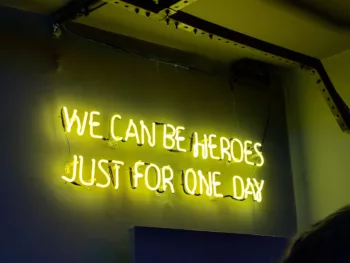Throughout his life, Clive was someone who brought people together. So it was only right that his funeral did the same. Clive’s husband Angus explains how a humanist funeral helped him and Clive’s friends and family, celebrate the life of a special man.
A performer, teacher and enthusiastic traveller with a close family and an extremely wide circle of friends, Clive was known and dearly loved by many. So, when Clive died suddenly and unexpectedly in his late 50s, many people had tales about him, and their friendship, to share.
These funny, touching and varied stories were at the heart of his funeral ceremony. Friends and family heard about a school trip to Russia that ignited Clive’s love of travel; discovered the unconventional way he learnt to drive; recalled his flamboyant dance moves; talked about the friends he made in the 1980s a member of the Campaign for Homosexual Equality; paid tribute to his many theatrical roles; celebrated the fun, kindness and loyalty that he showed to all; and remembered the warm, welcoming home which he and Angus created together.
‘There were so many people involved in the funeral’
‘‘It happened very organically,’ says Angus, remembering how they decided who would speak at the funeral. ‘I knew I wanted to say something but I knew I would find it really difficult. I knew Clive’s family would want to contribute, as they were very much in his life, and they nominated his brother to speak.
‘There were also colleagues and his closest friends, Debbie and Derek. He and Derek had gone to school together and he’d known Debbie for decades. Then there were so many other people important to him who were involved in different ways – doing readings or carrying the coffin.
‘Our celebrant suggested that we live-streamed the ceremony, as there were many of Clive’s friends overseas – from Europe, the US, Australia and New Zealand – who couldn’t travel. That way, they could feel part of it too.’
‘I want that song at my funeral!’
The flexibility of a humanist funeral meant that these many tributes could be included within an hour-long ceremony, in which music also played a crucial role.
‘Music was a significant part of Clive’s life, one of his passions,’ says Angus. ‘I knew from the off that music would be a big part of the ceremony. We’re both such music-heads – we were always hearing a song and saying, ‘I want that at my funeral!’ Clive especially loved Bowie and Kate Bush, but all the songs we chose would have meant something to him.’

There were other small, but significant, touches that made the ceremony feel very personal.
‘We projected a montage of photos,’ says Angus. ‘And we asked people to wear something that Clive would have liked. It wasn’t all black or all bright colours – we left it up to people to decide for themselves what felt right.’
‘He knew he wanted a humanist funeral’
The celebrant played an important role, providing structure and reassurance to Angus and to everyone involved in the ceremony.
‘When someone dies suddenly, there’s shock and grief, but there are loads of practicalities to deal with too. It was good to have someone on side who knew how the official stuff worked. She knew the funeral directors and could work with them. She made sure we were all on the same page.
‘She could say, ‘What about that?’ or ‘Have you thought about this?’ and share ideas. She suggested one of the readings, and I chose another, from Kahlil Gibran’s The Prophet, which had been read at our wedding.
‘Clive knew that he wanted a humanist funeral. Neither of us are religious, so a religious ceremony would have felt hypocritical. The values wouldn’t have meant anything to us. The fact that a humanist funeral was an option was important to me.’
‘We weren’t constrained by tradition’
Nearly three years on from Clive’s sudden death, Angus can now look back on the funeral and reflect on how much it meant to him and to Clive’s friends and family.
‘I don’t look back and think, I wish we’d done or said anything differently,’ he says. ‘I’m really pleased with the way it went. Having a humanist funeral felt liberating. We weren’t constrained by tradition or by formalities. We could tailor the funeral to the person that Clive was, and make it fully authentic to him and life. You couldn’t do that with a religious funeral. It felt right for someone like Clive that we had so much freedom.
‘Our celebrant suggested having a standing ovation for Clive at the end of the ceremony, to remember his love for the stage. It was brilliant. The crematorium was packed to the gills and there was a real outpouring of love and emotion in the room, as it rang with loud applause, and whoops and cheers. The weather on the day was horrible but, at the end of the ceremony, just as we were about to start clapping, the sun shone through the stained glass window. It was strangely appropriate for a man so loved by so many.’
Looking back, Angus sums up the values expressed through Clive’s life, and reflected in his funeral ceremony: ‘It was all about love, that’s it in one word! Love was the most important thing.’





